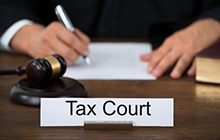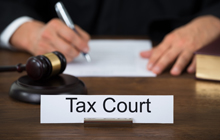Barrs v The Queen: Taxpayer relief under S.220(3.1)

Canadian accountant and tax lawyer David J Rotfleisch on a Federal Court of Appeal case involving a CRA's review officer's failure to engage with a request for equitable treatment
 |
David J Rotfleisch, CPA, JD is the founding tax lawyer of Taxpage.com and Rotfleisch & Samulovitch P.C., a Toronto-based boutique tax law corporate law firm. |
Federal Court of Appeal ruled that the CRA's review officer's failure to engage with the request for equitable treatment was unreasonable
In Barrs v Canada, 2022 FCA 147, the taxpayer requested a greater sum of accrued interest relief than granted by the Canada Revenue Agency, arguing that this would afford an equitable treatment that brings the amount of relief closer to other taxpayers who made their requests earlier. Barrs appealed a Federal Court decision that dismissed his application for a judicial review of the CRA's third-level review of his interest relief request.
In the mid-1980s, Barrs and other taxpayers invested in a tax scheme that was a fraud. The CRA reassessed their tax returns and disallowed the losses and deductions claimed from such a tax scheme. Among the investors who requested interest relief, those who made a claim in 2004 received approximately 15 years of cancellation of accrued interest, while Barrs and those who requested relief in 2014 received only 63 months [five years, three months]. The CRA considered the lower amount for the 2014 requesters appropriate as it reflected what CRA considered to be the 10-year limitation period on seeking relief, according to the 2005 amendment to s. 220(3.1).
The Federal Court of Appeal eventually held that in failing to find the CRA review officer's decision unreasonable, the Federal Court did not correctly apply the standard of review of reasonableness. The Federal Court of Appeal thus ordered the relief request to be remitted back to the CRA to be redetermined by another review officer.
Background: Barrs v The Queen
In the mid-1980s, Barrs and other taxpayers invested in limited partnerships promoted and marketed to provide tax savings by way of flow-through losses and deductions. This investment scheme turned out to be fraudulent. The Minister audited and reassessed the taxpayers who invested by disallowing claimed deductions. Barrs and some other taxpayers appealed the reassessment, and some (not including Barrs) requested interest relief in 2004, while Barrs and the rest of the taxpayers requested interest relief in 2014.
In 2004, when the first group of taxpayers made their request for relief, subsection 220(3.1) of the ITA did not limit the period in respect of which the Minister could afford relief. However, in 2005, this subsection was amended to place a 10-year limit on the period during which the Minister may afford relief.
On the first-level review, CRA cancelled 14 years of accrued interest for the 2004 requesters and 51 months of accrued interest for the 2014 requesters. As a result of the second-level review, a further 12 months of accrued interest was cancelled for both groups. The 2004 requesters, therefore, received much greater partial interest relief.
During the third-level review, the 2014 requester's demand for further cancellation of interest was denied. Barrs and several other taxpayers brought applications for judicial review before the Federal Court to set aside the third-level review. These applications were dismissed, as reported in Brandimarte v Canada, 2019 FC 1034.
Barrs appealed to the Federal Court of Appeal. Several other taxpayers whose applications were also dismissed by the Federal Court in Brandimarte also applied to the Federal Court of Appeal, but their appeals were dismissed in Belchetz v Canada (National Revenue), 2020 FCA 225.
Tax Issue In Dispute
Did the CRA's review officer act reasonably to dismiss the taxpayer's relief request? The key question for the Federal Court of Appeal to consider was whether the Federal Court erred in its decision in Brandimarte where it determined the CRA's third-level review officers' treatment of Barrs' relief request was reasonable.
The FCA's reasoning and decision
Barrs sought equitable treatment with taxpayers who had requested relief in 2004 and received a greater amount of interest relief than him. Unlike all the taxpayers who appealed in Belchetz and had made their claims in 2004, Barrs was the only remaining taxpayer pursuing an appeal to whom the 10-year limitation period applied. Because of this, the Federal Court of Appeal found that his request for equitable treatment was distinct because it did not arise in the other taxpayers' cases in Belchetz (Barrs, at para 21).
Further, the Federal Court of Appeal found that it may have been possible for the CRA to grant additional relief without running afoul of the limitation period in subsection 220(3.1) of the ITA, given that relief had been granted during the first two levels of review only came to approximately one-half of the 10-year period preceding 2014. The Federal Court of Appeal, following its jurisprudence in Bozzer v Canada, held that the presence of the 10-year limitation period is not a complete answer to Barr's claim for equitable treatment. As a result, it may be open for CRA to grant him additional relief from interest that had accrued from 2004 onward. The Court reasoned that granting additional relief would "promote equity with the group of taxpayers who had requested relief in 2004" (Barrs, at para 36).
The Court commented that Barr's claim for equal treatment was reasonable, considering the fact that he was facing an interest bill far exceeding those of the 2004 requesters, yet they "all invested in the same scheme and had their claims for interest relief examined by the same review officers based on the same facts."
Finally, citing Vavilov, 2019 SCC 65, the Federal Court of Appeal found that the Federal Court identified the correct standard of review of reasonableness. Still, it erred in its application (Barrs, at para 35). Since the third-level review officer failed to engage with the request for equitable treatment, and such a failure will generally render an administrative decision unreasonable, the Federal Court of Appeal held that the review officer's decision must be set aside (Barrs, at para 38).
Therefore, the Federal Court of Appeal allowed Barr's appeal and remitted the relief request for redetermination by the CRA.
Editor's note: According to the decision, Mr. Barrs invested in limited partnerships promoted by the Overseas Credit and Guaranty Corporation. Its principals were found guilty of tax fraud in 1999 (the largest tax fraud at the time in Canadian history) and sentenced to jail in 2000.
David J Rotfleisch, CPA, JD is the founding tax lawyer of Taxpage.com and Rotfleisch & Samulovitch P.C., a Toronto-based boutique tax law corporate law firm and is a Certified Specialist in Taxation Law who has completed the CICA in-depth tax planning course. He appears regularly in print, radio and TV and blogs extensively.
With over 30 years of experience as both a lawyer and chartered professional accountant, he has helped start-up businesses, cryptocurrency traders, resident and non-resident business owners and corporations with their tax planning, with will and estate planning, voluntary disclosures and tax dispute resolution including tax audit representation and tax litigation. Visit www.Taxpage.com and email David at david@taxpage.com. Read the original article on Taxpage. Photo David Rotfleisch courtesy Rotfleisch & Samulovitch P.C.










(0) Comments